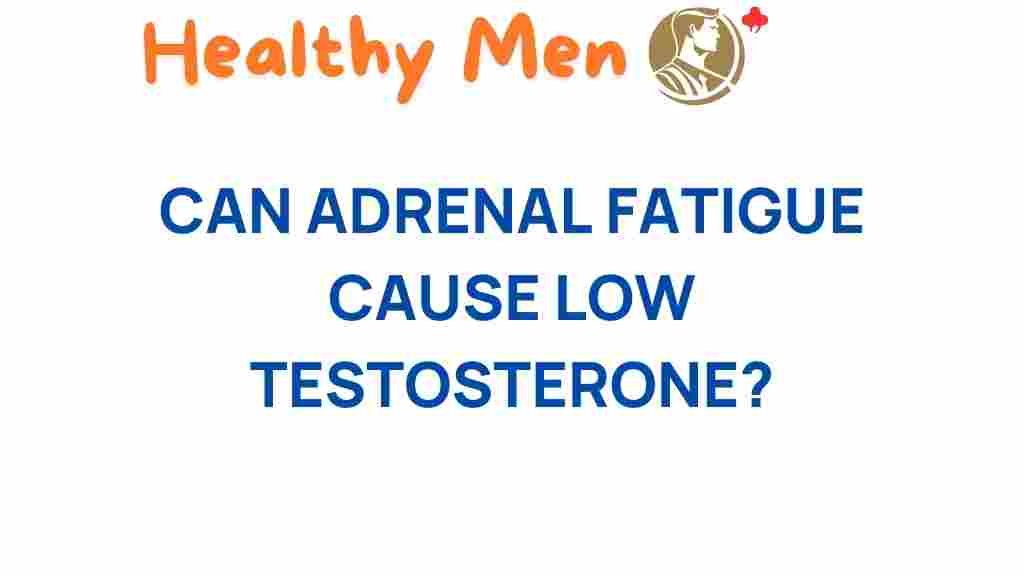Unraveling the Connection: Can Adrenal Fatigue Lead to Low Testosterone?
In recent years, the terms adrenal fatigue and low testosterone have gained significant attention in the health and wellness community. Many people are beginning to connect the dots between chronic stress, hormonal imbalances, and their overall health. Understanding the intricate relationship between these conditions is crucial for effective fatigue recovery and maintaining a balanced endocrine system.
Understanding Adrenal Fatigue
Adrenal fatigue is a term that describes a collection of symptoms that arise when the adrenal glands become overworked and unable to produce adequate amounts of hormones, particularly cortisol. This condition is often triggered by prolonged periods of stress, whether physical, emotional, or environmental.
- Symptoms of adrenal fatigue include:
- Chronic fatigue
- Sleep disturbances
- Reduced stamina
- Increased cravings for salt or sugar
- Difficulty concentrating
- Low mood or irritability
When the body is under constant stress, the adrenal glands produce excess cortisol in an attempt to manage this stress response. Over time, this can lead to a depletion of the adrenal glands and result in hormonal imbalances.
The Role of Testosterone in the Body
Testosterone is a vital hormone primarily produced in the testes in men and in smaller amounts in women’s ovaries and adrenal glands. It plays a crucial role in various bodily functions, including:
- Regulating libido
- Maintaining muscle mass
- Supporting bone density
- Influencing mood and energy levels
Low testosterone, also known as hypogonadism, can significantly affect a person’s quality of life, leading to issues such as decreased libido, muscle weakness, fatigue, and mood swings. The connection between adrenal fatigue and low testosterone is becoming increasingly evident as research uncovers the impact of stress on hormonal health.
How Adrenal Fatigue Affects Testosterone Levels
When the body is constantly stressed, the adrenal glands prioritize the production of cortisol over other hormones, including testosterone. This shift can lead to a state of hormonal imbalance where testosterone levels drop. Here’s how this process works:
- Chronic Stress: Prolonged exposure to stress leads to elevated cortisol levels.
- Cortisol Production: The adrenal glands divert resources to produce cortisol, often at the expense of testosterone.
- Hormonal Imbalance: Over time, this can lead to low testosterone levels, resulting in various health effects.
This cascade of events underscores the importance of managing stress and supporting adrenal health to maintain optimal testosterone levels.
The Health Effects of Low Testosterone
Low testosterone can have a profound impact on physical and mental health. Some common health effects include:
- Physical Effects:
- Decreased muscle mass and strength
- Increased body fat
- Fatigue and low energy
- Reduced bone density, increasing the risk of fractures
- Mental Effects:
- Depression and anxiety
- Difficulty concentrating and memory issues
- Decreased motivation and drive
Recognizing the symptoms of low testosterone is crucial for seeking appropriate treatment and recovery strategies.
Steps to Address Adrenal Fatigue and Low Testosterone
If you suspect you are dealing with adrenal fatigue or low testosterone, taking proactive steps can help restore balance to your hormonal health. Here’s a step-by-step process:
1. Recognize the Symptoms
Identify the symptoms of both adrenal fatigue and low testosterone. Keeping a journal of your symptoms can help track patterns and triggers.
2. Consult a Healthcare Professional
Schedule an appointment with a healthcare provider to discuss your symptoms. Consider requesting comprehensive hormonal testing to evaluate cortisol and testosterone levels.
3. Manage Stress
Implement stress-reducing techniques into your daily routine. Some effective methods include:
- Meditation and mindfulness practices
- Regular physical activity
- Deep breathing exercises
- Yoga or tai chi
4. Optimize Nutrition
Focus on a balanced diet that supports adrenal health and testosterone production. Incorporate:
- Healthy fats (avocados, nuts, olive oil)
- Lean proteins (chicken, fish, legumes)
- Whole grains and fiber-rich foods
- Fruits and vegetables for vital nutrients
5. Consider Supplements
Some supplements may help support adrenal function and hormone levels, such as:
- Vitamin D
- Zinc
- Magnesium
- Adaptogenic herbs (ashwagandha, rhodiola)
Always consult with a healthcare professional before starting any new supplement regimen.
6. Prioritize Sleep
Aim for 7-9 hours of quality sleep each night. Establish a calming bedtime routine and create a sleep-conducive environment to improve your sleep quality.
7. Monitor Progress
Keep track of your symptoms and any changes in your health. Regular follow-ups with your healthcare provider can help assess your recovery and make necessary adjustments to your treatment plan.
Troubleshooting Tips for Hormonal Imbalance
If you are experiencing ongoing challenges with hormonal imbalance, consider the following troubleshooting tips:
- Stay Hydrated: Drink plenty of water to support overall health and hormonal balance.
- Avoid Caffeine and Alcohol: Limit these substances, as they can exacerbate adrenal fatigue and hormonal issues.
- Engage in Regular Exercise: Aim for a balanced exercise routine that includes both aerobic and strength training.
- Seek Support: Consider joining support groups or seeking counseling to address emotional stressors.
Conclusion
The connection between adrenal fatigue and low testosterone is a complex but crucial aspect of understanding hormonal health. By recognizing the signs of adrenal fatigue and low testosterone, and implementing effective strategies for fatigue recovery, individuals can work towards restoring balance within their endocrine system.
Prioritizing stress management, nutrition, and overall well-being can create a positive impact on hormonal levels and enhance quality of life. For more information on managing stress and hormonal health, check out this comprehensive guide.
Taking charge of your health journey is the first step towards a more vibrant and energized life. Remember, seeking help from professionals and staying informed can make all the difference in achieving hormonal balance.
For further reading on the effects of stress on health, visit this research study.
This article is in the category Conditions and created by healthymen Team
